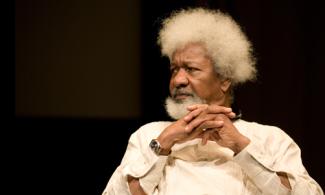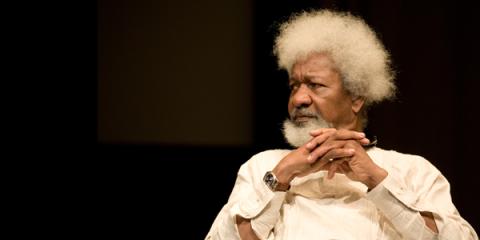
He has used his poems, plays, novels, memoirs and essays as vehicles to challenge repressive and incompetent leaders, skewer pomposity, challenge our assumptions and to take on a wide range of subjects, many of these uncomfortable, but necessary.

One of my favorite works of Professor Wole Soyinka is “telephone conversation,” a poem written more than 50 years ago while he was a student in London.
Telephone conversation is a hilarious take on a very serious subject of racism encountered by African students from prospective landlords in 1950 London. It is engrossing, brilliant and as relevant today as it was back then.
The poem begins this way: “the price seemed reasonable, location indifferent. The landlady swore she lived off premise. Nothing remained but self-confession, “madam,” I warned, “I hate a wasted journey, I am African.”
Then further down the poem continues.
“Are you dark? Or very light?” The landlord asks.
The response: “you mean like plain or milk chocolate?”
The poem ends this way:
“Facially, I am brunette, but madam you should see the rest of me. Palm of my hand, soles of my feet are peroxide blonde.”
For nearly 60 years, Professor Soyinka, who turned 85 this month, has championed freedom, justice and human rights. He has been an advocate for the voiceless, vigorously opposed censorship and served as a drum major for democracy worldwide.
He has used his poems, plays, novels, memoirs and essays as vehicles to challenge repressive and incompetent leaders, skewer pomposity, challenge our assumptions and to take on a wide range of subjects, many of these uncomfortable, but necessary.
For instance, in Kongi’s harvest, his prize-winning play which was later made into a movie by Ossie Davis, Soyinka satirizes a West African dictator who apparently plans to be president for life.
He has confronted crooked civilian leaders, mediocre civil servants and brutal megalomaniac military dictators.
In mid-1967, he was arrested and imprisoned without trial for nearly two years by Nigeria’s military dictator for trying to negotiate a peace deal with the leader of a breakaway region. Shortly after his release from prison, he was forced into exile in the United Kingdom, where he taught at Cambridge University. While in exile, he published “the man died: prison notes of Wole Soyinka,” a critically acclaimed memoir and searing indictment of military dictatorship.
An equal opportunity critic, he opposed Soviet hegemony in Eastern Europe, fiercely campaigned against apartheid in South Africa and scolded the United States for intervening in Nicaragua. He was a vocal critic of Sudan’s atrocities in Dafur. And he has long opposed the notion that African and Asian countries should be held to lesser standards on human rights violation for the ridiculous reason that western culture is still relatively new to them.
Soyinka once told an interviewer: “I have one abiding religion and it is human liberty.... Conditioned to the truth that life is meaningless, insulting, without this fullest liberty….”
Soyinka has also used literature as a channel for exploring, explaining and celebrating his native Yoruba culture – and by extension African tradition.
In Ake, a heartwarming 1982 memoir about the early years of his life, Soyinka entertains readers with tales of growing up in his hometown, Abeokuta, in southwestern Nigeria in the 1930s and 1940s. The New York Times named Ake one of the 12 best books of the year.
Unlike many of the literary titans of the last 60 years – novelist Toni Morrison, playwright August Wilson, poet Derek Walcottand short story writer Alice Munro – Soyinka has consistently distinguished himself as a master of several literary genres. He is a celebrated playwright, poet, memoirist and novelist, an actor, filmmaker and journalist. Soyinka may well be the most versatile writer in the English language today.
In 1986, his prodigious body of work earned him the Nobel Prize for literature – making him the first African and the first black person to win the world’s most important literary award.
In awarding him the prize, the Swedish academy singled out his plays "Death and the king's horseman" and "A dance of the forests" as "evidence that Soyinka is `one of the finest poetical playwrights to have written” in the English language.
The literary critic Thomas Hayes wrote: "(Soyinka’s) drama and fiction have challenged the West to….accept African standards of art and literature.
But Soyinka is more than just a brilliant writer and activist. He is a teacher who has shaped and influenced many lives.
For half a century, he has taught at some of the world’s finest universities, including Harvard, Yale, Cornell and Emory.Henry Louis gates, Jr.’, the distinguished Harvard scholar, has repeatedly described Soyinka as his mentor.
Writing in the New York Times, the noted historian Adam Hochschild described Soyinka as “among the Africans who deserve a secular sainthood….”
For me, Professor Soyinka exemplifies much of the ideals of a liberal arts education and much of what we try to instill in our students: broadmindedness, selflessness, courage, determination, vision and creativity. These pillars are critical not only for success in this increasingly global, highly competitive environment and uncertain times, but they are vital to ensuring that they create a legacy that is both meaningful and significant.
Wole Soyinka personifies success, significance, sacrifice and selflessness; one of the world’s greatest men of letters – the playwright, novelist, poet, actor, social critic, human rights activist, teacher and Nobel prize laureate professor Akinwande Oluwole Soyinka. Happy 85th!
Benjamin Ola. Akande is a former President of Westminster College, Fulton, Missouri and Vice Chancellor at Washington University, St. Louis, Missouri